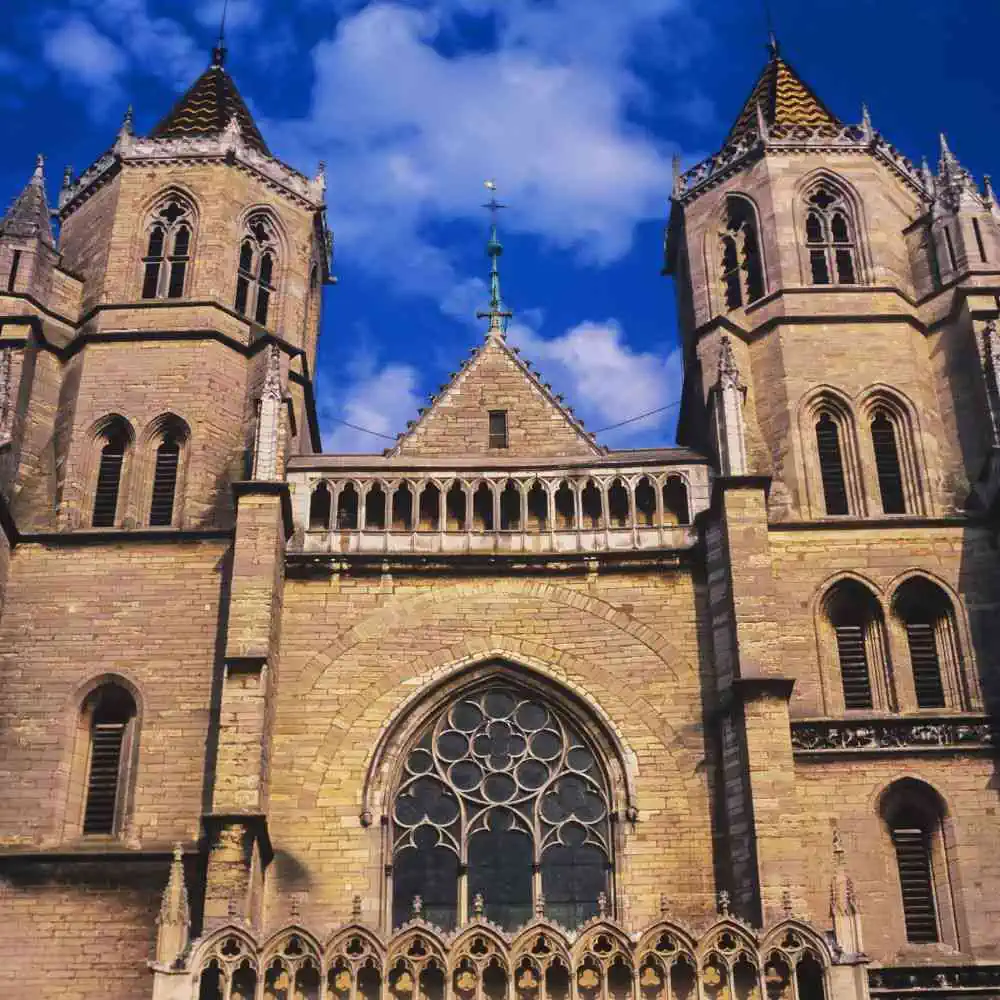You will depart from Dijon Ville, located right in the city center of Dijon, and enjoy the beautiful scenery of the journey while you arrive in Paris Gare Du Nord , also located in the heart of Paris.
Trains from Dijon to Parisfrom € 25.00
Trains from Dijon to Paris
Travelling by train: Dijon - Paris
Exploring the French Countryside: Journey by Train from Dijon to Paris
Embark on a journey by train from the historic city of Dijon, in Burgundy, to the charm and splendour of Paris. The train ride takes just over two hours, and you'll travel through some of France's most picturesque countryside, stopping at several important cities and towns along the way.
On your departure from Dijon Ville, you'll pass through the beautiful Côte-d'Or region, traveling through some of its most iconic villages, including Chablis and Auxerre, and through historic vineyards and forests. As you enter the Seine-et-Marne region, you'll pass majestic châteaux, ancient forests, and charming villages, including Provins and Coulommiers.
Finally, you'll reach the capital of France, Paris, where iconic landmarks and monuments await. You'll pass through the Gare de Marne-la-Vallée-Chessy, an important train hub for the region, and from there you'll arrive at the Gare du Nord in Paris. The Gare du Nord is one of the busiest and most iconic stations in Europe, and its intricately designed facade is sure to leave an impression.
This 1 hour 40 minutes journey takes you through around 310 kilometers of beautiful French countryside, connecting Dijon in Burgundy with the heart of Paris. No matter what time of year you go, the scenery is sure to impress. You'll never forget the sights of ancient vineyards, forests, and iconic landmarks, from the Côte-d'Or region to the capital of France.
So if you're seeing France, don't miss your chance to explore the French countryside by train from Dijon to Paris. It's sure to be a journey you won't soon forget!

Journey details
How long does that train from Dijon to Paris take?
The train journey from Dijon to Paris typically takes around 1 hour and 35 minutes.
What is the fastest journey from Dijon to Paris by train?
The fastest journey by train from Dijon to Paris can take about 1 hour and 30 minutes.
How much does the train cost from Dijon to Paris?
The cost of a train ticket from Dijon to Paris varies, but prices start from approximately €45.
How much does the Dijon to Paris?
Yes, there is a direct train service from Dijon to Paris, allowing for a hassle-free journey between these cities.
What is the distance from Dijon to Paris by train?
The distance from Dijon to Paris by train is about 315 kilometers.
Which are the cities that the train stops from Dijon to Paris?
The train from Dijon to Paris may stop at key cities depending on the service, including Montbard and Sens.
Dijon: Places to see
Dijon is an amazing city in France, full of cultural and historical sites. From the Ducal Palace to the Porte Guillaume, there’s so much to explore in this amazing city. Here’s our guide to 7 must-visit sites when traveling to Dijon!
Le Palais des Ducs et des États de Bourgogne: This palace was built in the 15th century and serves as a reminder of the city’s former power and influence. It was built during the Dukes of Burgundy’s reign and was listed as a UNESCO World Heritage Site in 2015. The palace is open from 10am – 6pm from April – October and 10am – 5pm from November – March. Admission fee is €8.50.
Porte Guillaume: This old city gate was built in the 16th century and is an icon of the city. The gate is incredibly well-preserved and is a popular spot for tourists. It’s open daily from 9am – 6pm and admission is free.
Notre Dame de Dijon: This Gothic church was built in the 13th century and is one of the most impressive churches in the city. It’s a popular place to visit for locals and tourists alike and it’s open daily from 10am – 7pm. Entrance is free.
Musée des Beaux Arts: This museum houses some of the world’s best artwork from the 15th to 20th centuries. It’s open Tuesday to Sunday from 10am – 6pm and admission is €7.
Place de la Libération: This square is a popular gathering place in the center of the city. The square is surrounded by beautiful homes and is a great place to relax and take in the atmosphere. It’s open daily and entrance is free.
Les Halles: This market is one of the most popular places in the city. It’s packed with stalls selling fresh local produce, cheese, and much more. It’s open Tuesday to Saturday from 6am – 6pm and Sunday from 7am – noon. Entrance is free.
La Fontaine d’Ouche: This fountain is an iconic landmark in the city. It was built in the 16th century and is a popular place to take pictures. It’s open daily and entrance is free.
When planning your visit to Dijon, be sure to explore these amazing sights and try the delicious local dishes. From Burgundy wine to coq au vin and the famous Dijon mustard, you won’t be disappointed!

Paris: Places to see
Paris is a city that needs no introduction. A dream destination for many people, it offers an incredible mix of historical and architectural sites, delicious food, and culture. What could be better? Planning a perfect trip to the captivating French capital can be quite a challenge, with so many attractions and attractions. Whether you want to spend a week, a month, or just a weekend exploring, you can easily find a way to spend time in Paris that suits your budget and interests. Here is a list of seven must-visit sites that should be at the top of your list when it comes to planning a trip to this fabulous city.
Tower Eiffel is probably the most famous monument in Paris. Located at the center of the city, it offers the most incredible views of the Parisian skyline. Tickets cost around €25. Insider tip: visit the tower in the morning to avoid the touristy crowds.
Louvre Museum, the world's largest art museum, is an absolute must-visit. It houses almost 500,000 works of art and is home to the famous Mona Lisa painting. Tickets cost €17 and the museum is open everyday except Tuesdays.
Notre-Dame Cathedral is the oldest church in Paris and its impressive architecture has inspired many writers. Free entry is allowed inside, but you will need to purchase tickets to visit the tower.
Jardin du Luxembourg is a beautiful garden known for its stunning flowerbeds and historical statues. Free entry.
Arc de Triomphe is a monument that stands proudly at the center of the Champs-Élysées. Entrance is free.
Les Catacombes is an underground ossuary that holds the remains of over six million people and is an interesting place to visit for history lovers. Tickets cost €11.
Sacré-Coeur Basilica is located at the highest point in the city. It offers fabulous views of Paris and is free to enter.
When it comes to food, no trip to Paris is complete without trying the amazing dishes. From crepes to macarons, there is something to suit every taste. Be sure to head to a local boulangerie to try some real Parisian delicacies.
Whether you decide to stay for a week or just a weekend, Paris will offer an unforgettable experience. With its stunning architecture, incredible culture, and delicious local food, there is something for everyone in this magical city.

Dijon: Main train stations
Dijon is a beautiful city in France and its main train station is called Gare de Dijon-Ville. It is a modern station recently renovated and offers a lot of services such as ticket office, self-service ticket machines, cafes and shops. There is also another important train station in Dijon, called Gare de Dijon-Porte Neuve.
Gare de Dijon-Ville is located at Avenue Charles de Gaulle and is open 24/7. You can find tourism information and help desk, free Wifi access, luggage storage, ATMs, taxi's and car rental options. There is free parking outside the station and telephone number is (33) 3 8 055 5555.
- Dijon Ville
Paris: Main train stations
The main train station in Paris is Gare du Nord; it is located in the city of France. It is one of the busiest railway stations in Europe and it serves thousands of passengers each day. Gare du Nord is not the only major station in Paris, as the city is home to several other train stations such as Gare de l'Est, Gare Saint-Lazare, Gare d'Austerlitz and Gare Montparnasse.
The address of Gare du Nord is 18 Rue de Dunkerque, 10th Arrondissement, Paris, 75009. The station is open 24/7. The phone number is +33 892 35 35 35. Gare du Nord has a luggage storage service, offering short and long-term storage.
- Paris Gare du Nord
- Paris Gare de Lyon
- Aeroport Paris Roissy Charles de Gaulle CDG T2
- Paris Gare de l’Est
- Aeroport Charles de Gaulle 2 RER
- Paris Montparnasse
- Paris Gare du Nord
- Aeroport Paris Roissy Charles de Gaulle CDG
- Gare De Lyon Banlieue
- Paris Austerlitz
- Paris St-Lazare
- Paris Bercy Bourgogne-Pays d’Auvergne
Dijon - Paris: How to get the best deals
Book in Advance:
Just like with airfares, train ticket prices tend to rise as the departure date gets closer. Booking weeks or even months in advance can save you a significant amount.
Travel During Off-Peak Hours:
Avoid traveling during peak times such as weekday mornings and evenings. Opt for midday, late evening, or mid-week rides when there's less demand.
Consider Slower Trains or non direct routes:
Express or high-speed trains might save time, but they're often pricier. Opting for regional or slower services can reduce your fare.
Look for Special Deals and Promotions:
Train operators occasionally have promotions or special deals, especially during off-peak seasons. It's worth signing up for newsletters. Additionally, there are sometimes group or return ticket discounts, so consider these options if they fit your travel plans.
- Contact Us


